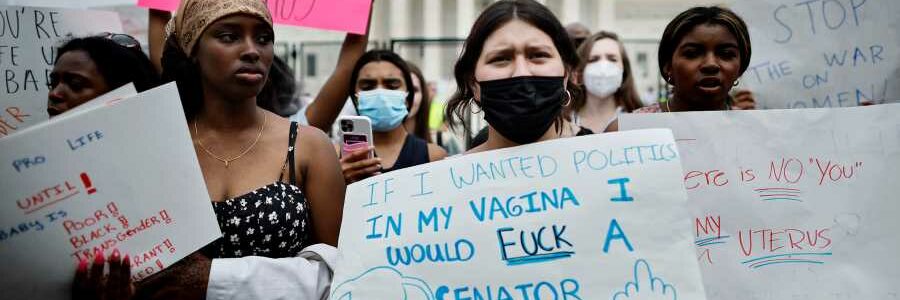
The Supreme Court's Liberal Justices Deliver Stark Warning: Overturning Roe is Just the Beginning
The three liberal justices who opposed Friday’s decision eliminating a constitutional right to an abortion did not hold back, writing a blistering dissent likening the “catastrophic” decision to a “loaded weapon” that “takes aim… at the rule of law.”
Justices Stephen Breyer, Sonia Sotomayor, and Elena Kagan, writing together, abandon legalese for plain language starkly laying out the consequences of the majority’s reactionary decision.
“It eliminates a 50-year-old constitutional right that safeguards women’s freedom and equal station,” they write, adding that it also “places in jeopardy other rights, from contraception to same-sex intimacy and marriage,” and crucially “undermines the Court’s legitimacy.”
Related Stories
Sony Music, Live Nation, Netflix, More Offer Staff Travel Reimbursement for Abortions
Maren Morris on Abortion Ruling: 'Tomorrow I Will Fight, But Today I Am Grieving'
Related Stories

'Silence of the Lambs': 'It Broke All the Rules'
Album Guide: Metallica
The dissent attacks the majority opinion on substantive, moral, historical, logical and legal grounds, warning that the institution has grown brazenly political with Donald Trump’s additions to the bench: “The Court reverses course [on Roe] today for one reason and one reason only: because the composition of this Court has changed.”
The court’s decision “consigns women to second-class citizenship” the dissenters write, adding that the majority has decided that “from the very moment of fertilization, a woman has no rights to speak of.”
The majority ruling deals a pregnant woman a “profound loss of autonomy and dignity,” the dissenters argue, because it “forces her to carry out the State’s will,” regardless if the government decides she must “bear her rapist’s child or a young girl her father’s” and “no matter if doing so will destroy her life.”
The dissenters blast the majority for upsetting five decades of legal precedent that carefully balanced the liberty interest of the mother against the life interests of the fetus, after the age of viability. For today’s majority, the dissenting justices write, “‘balance’ is a dirty word, as moderation is a foreign concept. The majority would allow States to ban abortion from conception onward because it does not think forced childbirth at all implicates a woman’s rights to equality and freedom.”
As a matter of law, the dissent hits the majority for a relying on historical intent of the constitution’s framers and the authors of the 14th amendment. They underscore that those men “did not understand women as full members of the community embraced by the phrase ‘We the People’” and “did not recognize women’s rights.” The dissent also notes that the nation’s early history regarding terminating pregnancy was hardly uniform: “Embarrassingly for the majority,” they write “early law in fact does provide some support for abortion rights.”
The dissenters blast the majority for pretending to wash the court’s hands of the abortion debate and return it to the realm of politics, where the conservatives claim it belongs. “Far from removing the Court from the abortion issue,” the dissenters write, “the majority puts the Court at the center of the coming ‘interjurisdictional abortion wars.’”
The court will soon be forced to decide, they note, whether states must allow abortions to protect a woman’s life and heath, and where to draw those lines: “How much risk to a woman’s life can a State force her to incur, before the Fourteenth Amendment’s protection of life kicks in?” the justices write. “And short of death, how much illness or injury can the State require her to accept, consistent with the Amendment’s protection of liberty and equality?”
Critically, the dissenters note that the right to an abortion is connected to other cherished liberties. They liken the reversal of Roe to yanking a block from a “Jenga tower” that could collapse Americans’ rights to birth control as well as “same-sex intimacy and marriage.”
“The right Roe and Casey recognized does not stand alone,” the justices argue, adding that abortion rights both built upon, and provided a foundation for, other decisions “protecting autonomous decisionmaking over the most personal of life decisions.”
These liberal justices chide the majority for suggesting that other constitutional rights aren’t implicated. “The first problem with the majority’s account comes from Justice Thomas’ concurrence—which makes clear he is not with the program,” they write — pointing to Thomas’ stated desire to “reconsider” the cases that guarantee contraception access and gay rights. “At least one Justice is planning to use the ticket of today’s decision again and again and again.”
Moreover, the dissenters write: “The lone rationale for what the majority does today is that the right to elect an abortion is not ‘deeply rooted in history.’” They argue that “either the majority does not really believe in its own reasoning. Or… all rights that have no history stretching back to the mid 19th century are insecure.”
They note that the threat to the established constitutional order is immense, including to the court ruling that overturned segregation. “If the Brown court had used the majority’s method of constitutional construction, it might not ever have overruled Plessy.” At a minimum, the dissenters insist, “Today’s opinion will fuel the fight to get contraception, and any other issues with a moral dimension, out of the Fourteenth Amendment and into state legislatures.”
The dissenters underscore that today’s decision represents a time warp with few precedents in American life. “After today, young women will come of age with fewer rights than their mothers and grandmothers had,” they write, adding that “the majority’s refusal even to consider the life-altering consequences of reversing Roe and Casey is a stunning indictment of its decision.”
The liberal justices mark this somber day with words of mourning: “With sorrow — for this Court, but more, for the many millions of American women who have today lost a fundamental constitutional protection,” they write, “we dissent.”
Source: Read Full Article